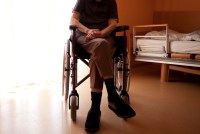Latest KFF Health News Stories
Should You Bring Mom Home From Assisted Living During The Pandemic?
Families are weighing the challenges of providing home care with the isolation or potential danger of leaving folks in senior housing or long-term care.
¿Deberías sacar a tus padres de hogares y llevarlos a tu casa durante la pandemia?
Las familias se enfrentan a ese dilema. En los hogares de vida asistida los adultos mayores tienen alimentos y cuidado médico. En la casa tienen el amor de la familia.
More Than 5,000 Surgery Centers Can Now Serve As Makeshift Hospitals During COVID-19 Crisis
Under pressure, the federal government announced it will let surgery centers, hotels and even college dorms serve as hospitals to treat an overflow of patients.
COVID-19 Bonanza: Stimulus Hands Health Industry Billions Not Directly Related To Pandemic
Congress retreats on long-planned cost cuts to benefit the health care industry with a grab bag full of incentives.
Already Taxed Health Care Workers Not ‘Immune’ From Layoffs And Less Pay
Revenue is way down for primary care, specialty physicians and some hospitals as patients avoid non-urgent visits. Practices small and large are doling out layoffs and furloughs to staff.
¿Por qué lleva tanto tiempo? Cómo es el paso a paso de una prueba para COVID-19
Desde la toma de la muestra con un hisopo hasta el paso final, expertos explican cómo se trata la muestra para COVID-19, y explican futuros tests rápidos que podrían arrojar un resultado en minutos.
A pesar de la pandemia, profesionales de salud no son inmunes a los despidos
Consultorios y grupos médicos en todo el país están dando licencia forzada a personal no médico. Y también recortando salarios luego que se suspendieran procedimientos electivos y se comenzaran a cancelar citas no urgentes.
Más de 5,000 centros de cirugía serán hospitales improvisados durante la crisis de COVID-19
Esto le dará al país miles de camas hospitalarias y salas quirúrgicas adicionales, algunas de las cuales cuentan con respiradores o máquinas de anestesia que podrían ser reconvertidas en respiradores.
Opinion writers weigh in on these health care topics and others.
China’s Failed Alarm System: Some Wuhan Health Officials Kept News Of Spread In Dark For Too Long
The New York Times reports that some local health officials disobeyed rules and chose not to inform Beijing of the mysterious pneumonia, causing the country and world lost time. Global news is on Japan, France, Italy, Germany, Switzerland, Gaza, Egypt, Israel, Peru, Guatemala and other countries, as well.
Editorial pages express opinions about ways to deal with COVID-19.
How A Straight-Shooting New Yorker Won Over The Public’s Attention
The Los Angeles Times takes a look at how Dr. Anthony Fauci got where he is serving under but Democratic and Republican presidents. Some have praised his ability to contradict President Donald Trump’s more optimistic messaging. Meanwhile, Fauci’s prediction that the death toll could climb past 100,000 may have swayed Trump’s decision to extend social distancing guidelines through April.
ProPublica and KHN have obtained emails that show missteps from the CDC and other agencies in the early, crucial days of the outbreak. What comes through clearly is confusion, as the CDC underestimated the threat from the virus and stumbled in communicating to local public health officials about what should be done.
Health care providers from the state that was among the first hit by the outbreak have stories about having to reuse masks and remove expiration date stickers from protective gear. The issue has raised red flags across the country, especially since health workers account for an outsized percentage of cases.
Advocates Plea For Inmates’ Release To Slow Contagion As First Death Occurs In Federal Prison
The Louisiana inmate was serving a 30-year sentence for drug trafficking. Other prison news is on the risk to the more than 2 million prisoners held in detention centers.
Coronavirus Patients Caught In Conflict Between Hospital And Nursing Homes
Hospitals need to clear out patients who no longer need acute care. But nursing homes are alarmed at the prospect of taking patients who may have the coronavirus.
Access To Abortion Shrinks Further As More States Halt The Procedure During Pandemic
In Texas, abortion providers talk about the way the state’s new restrictions on the procedure is already impacting patients. Meanwhile, Oklahoma’s governor says its suspension of elective surgeries includes abortion, unless necessary to save the mother. And anti-abortion activists in Georgia want that state to make the same move.
“At this time, VA has not received specific requests from FEMA for assistance,” the agency said. Veterans Affairs hospitals are supposed to serve as backup in times of crisis, but VA Secretary Robert Wilkie has made clear the agency won’t spring into action absent guidance from the federal government. Meanwhile, states across the country scramble to figure out what to do with their overflow patients. And some hospitals wrestle with federal guidance to scrap elective surgeries.
Because Humans Have Never Experienced This Coronavirus, We Are ‘Kind Of Sitting Ducks’ In Its Sights
Experts take a look at how contagious the virus is on a population that’s never experienced it before. In other public health news: the painful xenophobia that comes with the outbreak, pregnancy and the coronavirus, smart thermometers and artificial intelligence, increased substance abuse risk, the stress of fighting addiction while social distancing, and more.
Orders have surged more than 150% as people order groceries and other supplies from their homes. Other news on essential workers is on meat packers, farm and trash industry jobs, as well.








